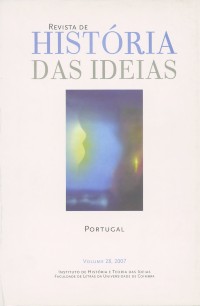Please use this identifier to cite or link to this item:
https://hdl.handle.net/10316.2/41637| DC Field | Value | Language |
|---|---|---|
| dc.contributor.author | Cordeiro, Cristina Robalo | - |
| dc.date.accessioned | 2017-05-06T23:23:32Z | |
| dc.date.accessioned | 2020-09-30T11:26:19Z | - |
| dc.date.available | 2017-05-06T23:23:32Z | |
| dc.date.available | 2020-09-30T11:26:19Z | - |
| dc.date.issued | 2007 | - |
| dc.identifier.issn | 0870-0958 | - |
| dc.identifier.issn | 2183-8925 (digital) | - |
| dc.identifier.uri | https://hdl.handle.net/10316.2/41637 | - |
| dc.description.abstract | O balanço dos principais inquéritos realizados pelos historiadores da literatura sobre as representações de Portugal em França atesta o desequilíbrio dos intercâmbios que marcou, durante muito tempo, as relações entre os dois países. Durante a idade clássica (de Montaigne a Montesquieu), as referências à nossa cultura e à nossa história são pouco frequentes. Só as rupturas dramáticas, como o Terramoto de 1755, a Primeira Guerra Mundial e a Revolução de Abril de 1974, trazem os Portugueses à lembrança. E é menos pela poesia do que pela filosofia que este reconhecimento se faz. De Voltaire a Sartre, Portugal interessa aos intelectuais mais do que aos pintores, servindo então de exemplo - negativo ou, mais raramente, positivo - para a edificação das nações. Le Voyage du Ci-devant duc du Châtelet en Portugal, que analisaremos em traços largos, é particularmente revelador de uma tal atitude "pedagógica". Aluno dotado mas teimoso, explorado por perversos protectores (a Igreja e a Inglaterra!), Portugal não pode assegurar a sua salvação senão confiando-se à direcção esclarecida de França. | por |
| dc.description.abstract | The conclusions drawn from the major surveys conducted by literary historians on French representations of Portugal confirm the imbalance that characterized, for a very long time, the interchanges between the two countries. During the Classical Age (from Montaigne to Montesquieu), references to Portuguese culture and history are rare. It takes such dramatic disruptions as the 1755 Lisbon Earthquake, the 1st World War and the 1974 Revolution to make the French aware of the Portuguese. Such awareness is accomplished not so much through poetry as through philosophy. From Voltaire to Sartre, Portugal is of greater interest to intellectuals than to painters, and thus can serve as an example -a negative example or, less often, a positive one- for the construction of nations. Le Voyage du Ci-devant duc du Châtelet en Portugal which we will analyse in broad outline, is particularly revealing of this "pedagogical" approach. A gifted but obstinate pupil, exploited by perverse protectors (the Church and England!), Portugal can only ensure salvation by entrusting itself to the enlightened guidance of France. | eng |
| dc.language.iso | por | - |
| dc.publisher | Imprensa da Universidade de Coimbra | - |
| dc.rights | open access | - |
| dc.title | Portugal visto de França: olhares filosóficos | por |
| dc.title.alternative | Portugal as viewed from France: a philosophical gaze | por |
| dc.type | article | - |
| uc.publication.collection | Revista de História das Ideias vol. 28 | - |
| uc.publication.firstPage | 609 | - |
| uc.publication.lastPage | 622 | - |
| uc.publication.location | Coimbra | - |
| uc.publication.journalTitle | Revista de História das Ideias | - |
| uc.publication.volume | 28 | por |
| dc.identifier.doi | 10.14195/2183-8925_28_21 | - |
| uc.publication.orderno | 22 | - |
| uc.publication.area | Artes e Humanidades | - |
| uc.publication.manifest | https://dl.uc.pt/json/iiif/10316.2/41637/248353/manifest?manifest=/json/iiif/10316.2/41637/248353/manifest | - |
| uc.publication.thumbnail | https://dl.uc.pt/retrieve/11859470 | - |
| item.grantfulltext | open | - |
| item.fulltext | With Fulltext | - |
| Appears in Collections: | Revista de História das Ideias | |
Files in This Item:
| File | Description | Size | Format | |
|---|---|---|---|---|
| portugual_visto_de_franca.pdf | 6.36 MB | Adobe PDF |  |
Items in DSpace are protected by copyright, with all rights reserved, unless otherwise indicated.
